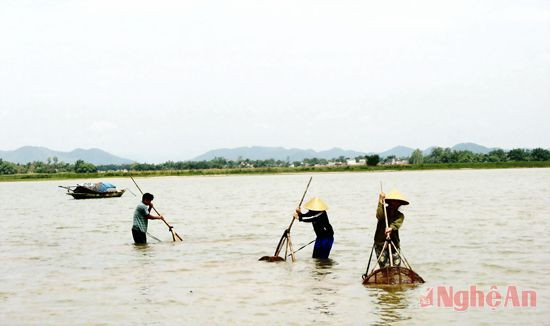Drifting with the tide
(Baonghean) - No one knows since when, women of Hung Lam fishing village (Hung Nguyen) have been attached to the profession of raking mussels on Lam river; the profession of "following" the water, which is a year-round drifting job with many hardships....
Summer noon on Lam river, the sun is like fire. The Lao wind is dry and hot... In the middle of the river (through Hung Lam commune), small figures are diligently raking and digging for mussels. In early summer days, the river water usually goes down around noon - when the heat reaches its peak, it is also the time when the women of hamlet 9, Hung Lam, rush to the riverbank to rake for mussels.
 |
| Women in Hung Lam fishing village (Hung Nguyen) rake mussels on Lam river. |
With handmade clam rakes made of bamboo, strapped to their bodies, the women wade out into the middle of the stream to rake and scoop. After each pull, the rakes are lifted up to be sifted and washed. The tiny clams gradually appear under the layer of mud and moss, plump and golden, sparkling under the sunlight. According to the experience of the fishermen, the clams on this stretch of the river are delicious and contain little sand. Because the river water here often rises and falls, sometimes twice a day (mother water, daughter water). In those days, the fishing villagers are unusually busy with the work of sifting sand and looking for clams.
Stopping her raking, wiping the sweat from her forehead, Ms. Hien, who has “seniority” in the clam raking profession, shared: “The first clam season, our people call it the clam season. The clams are small but firm and fat”. Then she showed me how to rake clams, parting the water, her feet probing the riverbed “only stopping to rake when her feet feel rough, uneven when there are many clams there”. Clam raking has been her family’s livelihood for many generations. For many generations, her family has lived “on” the river, considering the boat as their home, drifting with the water. However, thanks to many years of living on the “blessings” of the river, her family has been able to “reach the shore”.
The job of drifting on the river is also full of hardships. Born and raised in a fishing village, working as a clam raker all year round, Mrs. Lan knows every stretch of the river, the tides rising and falling. Now at the age of seventy, she never rests, because she misses her job, misses the river... "We go down to the river at any time when the water level goes down. There are days when the water level goes down early in the morning, at noon, in the afternoon, but there are days when it goes down late at night... On nights when the water level goes down, the women call each other to go down to the river to rake for mussels. At night, in the middle of the dark river, there are faint lights from the boats, everyone is busy raking and washing mussels as usual. Laughter, talking, the sound of winnowing and washing mussels... bustling along a stretch of the river. The hardest days are still the cold days, soaking in the water for hours to rake for mussels. The cold seems to penetrate every fiber of the flesh, but everyone grits their teeth, raking and winnowing, because the water level only goes down 4-5 hours, so everyone tries to rake before the water rises" - Mrs. Lan shares about the job she has been attached to for nearly half of her life. Then she smiled toothlessly: "If you work hard enough, you will get used to it. Now, if women and old people like us don't do it, we will miss our jobs."
According to the elders in the village, in the past, there were countless mussels in Hung Lam beach. From March, the mussel season began until December. Therefore, the fishermen here worked in the mussel business almost all year round, except during the flood months when the river water rose. Hung Lam mussels were available in all the rural markets, all the way down to the city.
Many households in the fishing village have moved ashore, built houses to protect them from the rain and sun; their children are also able to study thanks to the clam raking profession. The fishing village of hamlet 9, Hung Lam has 93 families, in the past they still stuck to the profession of drifting on the river, now more than 2/3 of the households have "moved ashore". However, the clam raking profession that has accompanied many generations, the fate of the people in that riverside fishing village is now gradually fading away. The clams are gradually decreasing due to the exploitation of sand and gravel. There is little land for production, so now most of the men and young people in the village (those who do not switch to the sand and gravel mining profession) either go to work elsewhere or are exported to work. Many people in the fishing village of Hung Lam are looking forward to a "settled life", having land for production, receiving technical support, and being assured of economic development to stabilize their lives, no longer dependent on the river.
However, the women in the fishing village still stick to the clam raking job all their lives. From the old people who now have gray hair and freckled skin, they still work hard, to the young girls who are still playing and eating, they also follow their grandmothers and mothers to the river on low water days... Because for them, clam raking is not only a way to make a living, but the job of "following" the water has become attached to the flesh and blood of each person in the fishing village.
Dinh Nguyet
